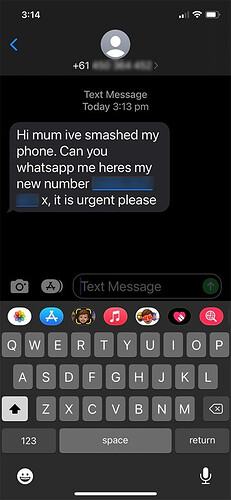When we surveyed Australian consumers in July, 52% told us they believe they’re being targeted by a scam every week and nine out of 10 said they had come across at least one suspected scam in the past year.
The focus of this year’s Scams Awareness Week is on impersonation scams. Impersonation scams are when scammers pose as trusted businesses, government agencies, family members or friends in order to steal your money or personal information. Here’s an example:
You can read more on spotting impersonation scams here:
If you have lost money or personal information to a scammer, or even just had a near miss, here’s the steps you can take to minimise harm:
Or read more here:
Seen a scam attempt? Let us know, leave a comment below.
4 Likes
I don’t think I have been “targetted” unless you regard a splatter gun approach “targetted”. I get many of these scams, sometimes many a day, by phone & email. They send out millions in the hope you might be a customer of that bank, telco etc and might fall for it.
I report them to Scamwatch, so I recon I have skewed the statistics, because I do the reporting, the scam just as equally is directed at Mr Z.
They impersonate NBN, telcos, banks, Visa/Mastercard, Amazon, my ISP (and usually easily detectable by TPG, but they keep letting them through - false TPG accounts etc), brands like Kogan, anti-virus like Notron, MyGov, various celebrities supposedly telling us how to Get Rich Quick (before the Banks close it down) like Dick Smith, Wally Ahleed, Charities (love the AI Chat Bot - keep her talking, ask her for statistics, or spurious issues and see how long before she says “Goodbye”. Not counting the cold call sellers who don’t respect the DNCR, or who are a sham solar company anyway (Solar Solutions - I’m looking at you).
1 Like
It depends on what class of impersonation you mean.
If you mean a scammer impersonating somebody I know and specifically targeting me through my association with that person (eg the hello mum scam) then no, I have not had any of those.
If you mean bulk spray and pray attempts to convince me that the caller belongs to Telstra, Microsoft (The Windows Department), Visa and Mastercard security etc, then they come and go. This week I have none, some weeks I will get a call daily or more often.
As far as I can see the main difference is the contact point the scammer can get hold of. In the first group it looks like they often work through text messages or faked voice messages which require knowing a mobile number.
The second group are usually mediated by landline phone (now NBN VOIP instead of copper wire) which is in the phone book in my case, or by email. I am very careful about who gets my email, clearly some merchants have sold mine as I get a few through that route. I have had a few emails that purport to be from my ISP trying to get my email account credentials.
For those that direct you to a fake web site imitating your bank, government agency or any major institution, I don’t recall any but I there may have been some that I didn’t see as I failed to click on the suspicious link in their suspicious email.
1 Like

